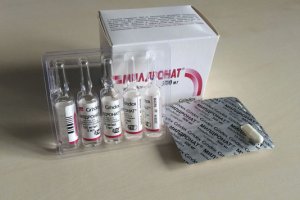Grindeks, the Latvian pharmaceutical company that manufactures meldonium under the trade name Mildronate, has strongly criticized the World Anti-Doping Agency (WADA) for its recent decision to add meldonium to its banned substances list. Grindeks insists that meldonium does not belong on the banned substance list since it is not a performance-enhancing drug (PED) or doping agent.
Grindeks fully cooperated with WADA in the summer of 2015 when the agency contacted them with questions about meldonium. Grindeks spokesperson Laila Klavina described its cooperation in a recent interview with the Russian News Agency TASS.
“It was last summer, when Grindeks jointly with the Anti-Doping Department of the Latvian State Center for Athletics Medicine provided WADA with all arguments, proof and reasoning why the drug should not be included in the list of the banned substances,” Klavina said.
Klavina complained that WADA never provided any explanation of its decision-making process that lad to the inclusion of meldonium on the Prohibited List. Even now, WADA has refused to provide any transparency regarding the factors that led to its decision.
“There was still no information from WADA last autumn, when it became obvious that meldonium would be on the list,” Klavina said. “All we know as of now is that meldonium on the list of the banned substances. Meanwhile, there is still no response from WADA.”
Grindeks is understandably upset with WADA since the agency completely disregarded the evidence it provided last summer. Grindeks described meldonium as a cytoprotective substance that reduces cellular damage of ischemic cells but does not enhance the performance of normal cells.
“The mechanism of action of meldonium is based on limitation of carnitine biosynthesis, which leads to deceleration of fatty acid oxidation and activation of glycolysis.
“Unlike carnitine, meldonium doesn’t cause increase of muscle mass and physical properties. Meldonium decreases cellular damage from ischemia by reducing accumulation of detergent substances (acylcarnitine and acyl-coenzyme A) in the mitochondria.”
Grindeks indicated that it was the promotion of carnitine biosynthesis that would lead to performance-enhancing effects. In fact, carnitine has long been marketed as a dietary supplement that can accelerate fatty acid oxidation and improve exercise and physical performance in athletes. A drug like meldonium would disrupt the process of carnitine biosynthesis and utilization.
“This is important in the treatment of pathologies associated with heart muscle ischemia (stenocardia, heart failure), because in these cases the heart is not getting enough oxygen and nutrients.”
“It means that meldonium cannot improve athletic performance, but it can stop tissue damage in the case of ischemia. That is why this therapeutic drug is not a doping agent.”
According to Grindeks, meldonium’s effect on carnitine biosynthesis and utilization make meldonium an unlikely performance-enhancing drug.
WADA allegedly makes it decision to include drugs on its Prohibited List if it meets any two of the following three criteria:
- There is medical or other scientific evidence, pharmacological effect or experience that the substance or method, alone or in combination with other substances or methods, has the potential to enhance or enhances sport performance;
- There is medical or other scientific evidence, pharmacological effect or experience that the use of the substance or method represents an actual or potential health risk to the athlete;
- That the use of the substance or method violates the spirit of sport.
Grindeks argued that meldonium fails to meet the first two criteria. Not only does the scientific evidence fail to show a performance-enhancing effect, the use of meldonium is considered extremely safe.
Ivar Kalvins, the medicinal chemist who first invented meldonium in the 1970s, considers meldonium so safe that it can potentially reduce the death rate in elite athletes who push their bodies to the limits in training. In other words, it can promote health and reduce harm.
“The sportsmen should be able to protect their health,” Kalvins said. “We are living in an era of evidence-based medicine, so there are not any other new data supporting the ban.”
WADA has yet to respond.
Source:
Health24. (March 18, 2016). Pill Maria Sharapova took is not a doping agent, says Grindeks. Retrieved from http://www.health24.com/Fitness/Sports-nutrition/pill-maria-sharapova-took-is-not-a-doping-agent-says-grindeks-20160317




